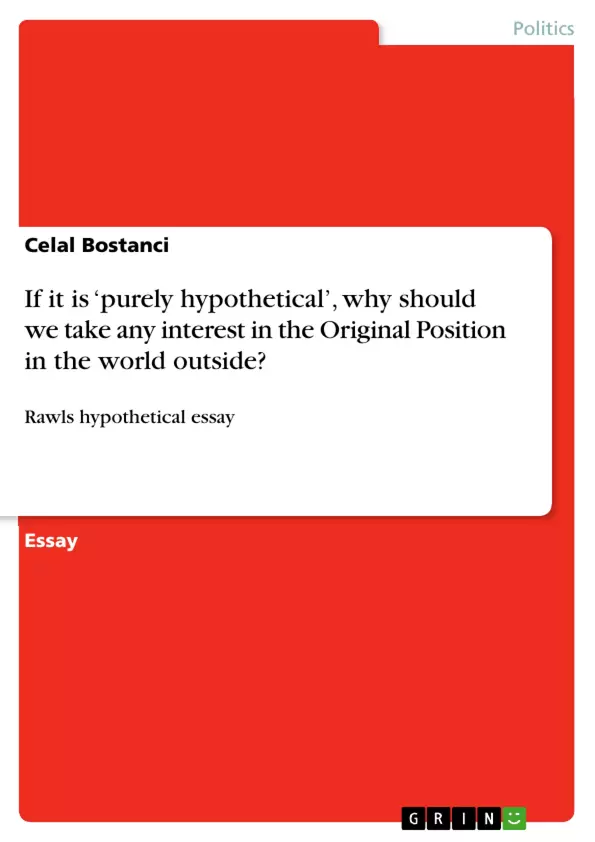If it is ‘purely hypothetical’, why should we take any interest in the Original Position in the world outside?
Although hypothetical contracts are frequently being criticized due to its non-binding nature which means that it cannot justify political authority and create political obligation, it has the ability to legitimate political arrangements. Hypothetical contracts serves as an instrument for the formation of the practical reasons of distinctive agents who are looking for an answer to a typical problem wherein the condition of the acceptance of the derived solution is agreed upon by everyone since it is the only way to resolve the issue (Knowles 2001, 279). However, most individuals perceive it as not sufficient enough to oblige a certain person to obey a rule or policy. But, under some instances, it can constitute to the legitimacy of the rule. It is significant for people to understand that the hypothetical consent attribute of a social contract theory is directed to establish legitimacy and not obligation. With this, we can determine that the facts that hypothetical contracts are not binding does not have to do anything regarding the creation of one's obligation. [...]
Inhaltsverzeichnis (Table of Contents)
- If it is 'Purely Hypothetical', Why should we Take any Interest in the Original Position in the World Outside?
- Hypothetical Contracts and Political Legitimacy
- The Original Position and Political Obligation
- Rawls' Contractarian Approach and its Relevance
- The Practical Limits of the Original Position
- The Importance of the Hypothetical Contract in a Real World Context
Zielsetzung und Themenschwerpunkte (Objectives and Key Themes)
This text explores the concept of the original position, a key feature of John Rawls' theory of justice as fairness, and its implications for understanding political obligation and legitimacy. It examines how the hypothetical nature of the original position can still contribute to our understanding of political arrangements, even if it cannot directly create binding obligations.- The role of hypothetical contracts in political legitimacy
- The limitations of hypothetical contracts in generating political obligation
- The original position as a framework for thinking about justice as fairness
- Rawls' contractarian approach and its potential to guide political arrangements
- The practical challenges of applying the original position in real-world contexts
Zusammenfassung der Kapitel (Chapter Summaries)
- The text begins by examining the role of hypothetical contracts in political legitimacy. It argues that, while these contracts cannot create binding obligations, they can still serve as a tool for understanding how individuals might come to agree on certain political arrangements. This is because hypothetical contracts represent a way of identifying the conditions under which people would be willing to accept a given solution, even if they are not legally bound to do so.
- The text then shifts to discuss the original position, a central concept in Rawls' theory of justice as fairness. The original position is a hypothetical scenario in which individuals are placed behind a "veil of ignorance," meaning they do not know their own social position, talents, or beliefs. This veil of ignorance is designed to ensure that the principles of justice chosen are fair and impartial, as individuals are forced to consider the interests of all members of society without bias.
- The text explores Rawls' contractarian approach and its relevance to understanding political obligation and arrangement. It explains that Rawls' approach offers a different way of thinking about political arrangements, not by asking directly about what is desirable, but by asking what individuals would choose if they were in the original position. This approach allows us to consider the feasibility of different arrangements, rather than simply focusing on their desirability.
- The text concludes by examining the practical limitations of the original position in the real world. It highlights the fact that, while the original position is a powerful theoretical construct, it is difficult to fully apply in practice due to the inevitable influence of individual biases and experiences. However, the text ultimately argues that the original position, even if it is purely hypothetical, can still provide valuable insights into how we can create more just and equitable societies.
Schlüsselwörter (Keywords)
This text centers on the themes of political obligation, legitimacy, and justice as fairness. Key concepts include hypothetical contracts, the original position, Rawls' contractarian approach, the veil of ignorance, and the practical challenges of applying theoretical concepts to real-world situations.Frequently Asked Questions
What is the "Original Position" in John Rawls' theory of justice?
The original position is a hypothetical scenario where individuals choose principles of justice behind a "veil of ignorance," ensuring fairness and impartiality.
What is the purpose of the "veil of ignorance"?
It prevents individuals from knowing their social status, talents, or personal beliefs, forcing them to consider the interests of all members of society equally.
Can a purely hypothetical contract create political obligation?
The text argues that while hypothetical contracts are not legally binding, they serve to establish political legitimacy by identifying conditions everyone would agree upon.
Why should we take interest in a hypothetical concept in the real world?
It provides a powerful theoretical framework for thinking about justice, fairness, and the feasibility of political arrangements without personal bias.
What are the practical limits of the Original Position?
In practice, it is difficult to fully apply because real-world individuals are always influenced by their specific experiences, biases, and social positions.
- Quote paper
- Celal Bostanci (Author), 2009, If it is ‘purely hypothetical’, why should we take any interest in the Original Position in the world outside?, Munich, GRIN Verlag, https://www.grin.com/document/140653



